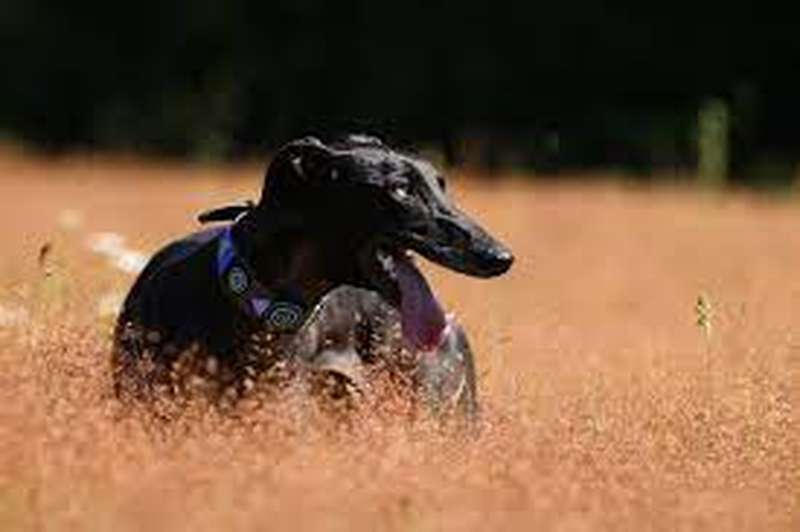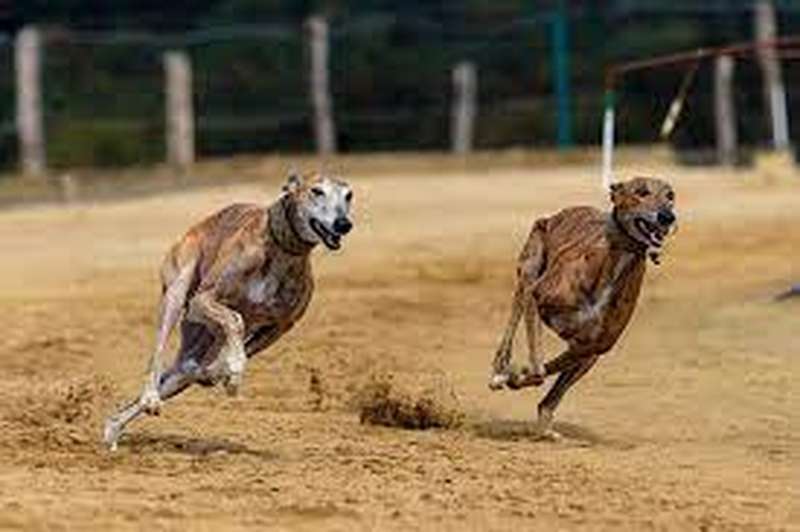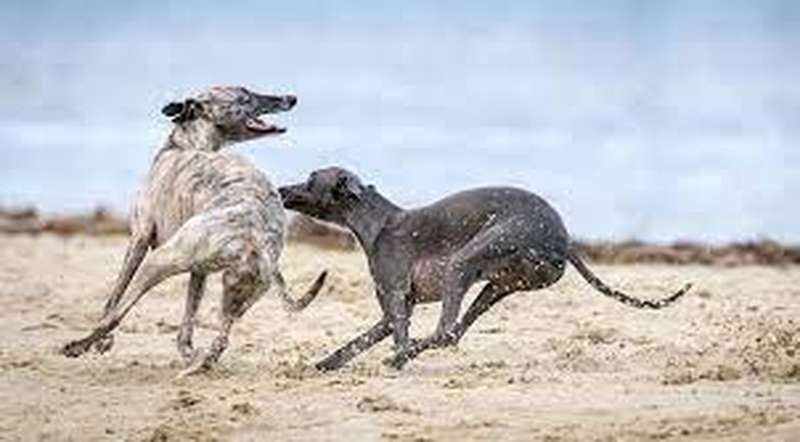Every year, a significant number of Irish greyhounds need new homes. If you are considering getting a new pet for your home, it is essential to carefully evaluate whether a greyhound would be a suitable choice for you.
However, aren’t greyhounds highly fit and athletic dogs that should only be placed in homes with physically active families of individuals with well-toned physiques who wear lycra? Please continue reading.
About Greyhounds.

The Greyhound is a member of the Sighthound family, which consists of hunting dogs. The sighthound is a slender and long-legged breed that excels in hunting.
It relies on its exceptional vision to detect the movement of prey animals even from great distances. Once a target is spotted, the sighthound uses its remarkable speed to chase and capture the prey swiftly.
The Greyhound is a distinct breed of sighthound that was primarily bred for track racing rather than hunting.
Greyhound racing is an industry characterized by high stakes and brutality, but fortunately, it is being increasingly banned in numerous communities.
Rescue groups play a crucial role in providing a second chance for retired or underperforming greyhound racing dogs, ensuring they are not subjected to untimely deaths. These organizations take in these dogs and provide them with foster care.
Greyhound rescue organizations are dedicated to teaching ex-racing canines who have spent their entire lives in kennels how to become well-mannered family pets. The preponderance of Greyhounds currently residing in households were formerly racing dogs.
Greyhounds possess a serene and self-reliant nature, which contributes to their calm and composed demeanor indoors.
They move with elegance and grace, avoiding any accidental collisions that could potentially cause damage to your lamps.
These dogs are known for their love of comfort, often seeking out cozy spots on a soft couch or underneath a warm blanket to snuggle in.

The Greyhound is the fastest breed of all. In fact, it can even outrun a horse in a sprint. After a brief burst of its powerful driving gallop, the Greyhound is quite content to spend the remainder of the day sleeping.
Owning a Greyhound comes with an important requirement: you should have a spacious, fenced area where they can sprint freely at least once every few days.
Greyhounds are not naturally inclined towards endurance activities. Therefore, they do not require or desire extensive periods of jogging exercise.
This particular breed is known to prefer a calm and tranquil environment, as well as individuals who have a gentle and soft-spoken demeanor. He struggles in an environment characterized by chronic tension or loud voices.
Greyhounds are typically polite and reserved when it comes to interacting with strangers. They tend to show their preference by leaning against their owner’s leg rather than approaching unfamiliar individuals.
Greyhounds are known to be peaceful when interacting with other dogs that are medium to large in size.
However, due to their heritage, they have a tendency to pursue cats and small dogs vigorously. However, many individuals can learn how to coexist with these smaller pets.
Greyhounds are known for their nonaggressive nature, often freezing when faced with a challenge or attack.
Additionally, they can be pretty touch-sensitive, often getting startled when unexpectedly touched. Due to their docile nature, it is important to train them with a gentle approach, emphasizing praise rather than correction.
The dog is quiet and rarely barks. However, there are many individuals who derive great pleasure from stealing and hoarding food and toys.
If you are interested in owning a dog, that…
- The individual possesses a tall, slender, and elegant physique.
- The animal has a sleek and easy-to-care-for coat that is available in a wide range of colors.
- She is incredibly athletic and graceful, able to run swiftly and jump to great heights.
- She possesses a serene and tranquil demeanor that is frequently compared to that of a cat.
- He is polite with both people and other dogs.
- Ex-racing dogs can be easily obtained through various Greyhound rescue organizations.
A Greyhound might be a suitable choice for you.

If you prefer not to handle…
- Creating a secure and enclosed space where he can have the opportunity to gallop from time to time.
- I have strong instincts to chase after other living creatures that are running.
- There is a possibility of developing fearfulness or timidity if a dog is not adequately socialized.
- An independent perspective focused on personal benefits. One’s attitude towards training is an important factor to consider.
- Being emotionally sensitive to stress and abrupt changes in schedule.
- The dog’s slowness in housebreaking is noticeable.
A Greyhound might not be the most suitable choice for you.
- One way to mitigate negative traits is by selecting an adult dog from an animal shelter or rescue group. When adopting an adult dog, it is easier to assess its traits and behaviors. Many adult Greyhounds have already demonstrated that they do not possess any undesirable characteristics. Absolutely, you have the opportunity to adopt a magnificent Greyhound from rescue groups that specialize in finding homes for ex-racing dogs in need of a loving home.
- To minimize the likelihood of encountering negative traits in a puppy, it is important to carefully select both the breeder and the specific puppy you are considering. Determining whether a puppy has inherited temperament or health issues is often challenging until they reach adulthood.
- By training your Greyhound to respect you, you can ultimately prevent the development of negative traits.
More Greyhound characteristics and attributes
If I were considering getting a Greyhound, my primary concerns would revolve around…
Ensuring an adequate amount of running exercise.
Greyhounds do not require extensive running, but they also cannot thrive in a small yard with only short walks on a leash around the block.
While they may enjoy being couch potatoes, these dogs also require regular access to a spacious, fenced area where they can run and gallop.
This is important because these dogs have a strong inclination to chase and possess keen eyesight for detecting movement; if something on the horizon catches their attention while outside a fenced area, they will immediately run off and not return.
Pursuing other creatures that are on the go.
Greyhounds typically get along well with other pets in their own family. However, these animals are incredibly fast, and individuals with a strong instinct to hunt could cause serious harm or even kill small animals that are running.
The independent temperament.
Sighthounds possess distinct characteristics that set them apart from other dog breeds. Unlike many other breeds, they won’t attempt to drag you around on a leash. Instead, they may exhibit passive resistance by firmly planting their legs and refusing to move.
Greyhounds are known for being independent thinkers and may not prioritize pleasing their owners.
Therefore, it is important to establish a strong leader-follower relationship with your Greyhound, ensuring that they understand and respect your commands.
Sensitive to emotions.
Suppose there is any tension in your home. Do people tend to be loud, angry, or emotional? Are there any arguments?
Greyhounds are highly susceptible to stress and may experience physical symptoms such as digestive upsets and neurotic behaviors if they are exposed to family problems within their household. Sighthounds are dogs that thrive in peaceful environments and require a calm and harmonious home.
Housebreaking.
Instead of acquiring Greyhound puppies, most people choose to adopt adult ex-racing dogs. These dogs have spent their lives in kennels rather than in a family home.
Whether the dog will develop good or bad bathroom habits can vary. The breed is typically known for being clean.
I am experiencing health problems.
Greyhounds have a high susceptibility to a potentially fatal digestive syndrome known as bloat. This condition can occur suddenly and has the potential to cause death within a matter of hours.
Furthermore, there is a concerning prevalence of early deaths due to cancer among Greyhounds.
5 reasons why greyhounds make excellent household companions
They are a community-based breed.
Greyhounds are among the few dog breeds qualifying you for community membership. Unlike dog walkers, Greyhound fans will cross the street to admire your greyhound and tell you about their experience.
Many Irish individuals have trained, kenneled, or watched greyhound races, and their devotion to the breed seems to cross gender and age lines.
A woman with a greyhound will be approached by older men for a discussion. Sighthounds, like greyhounds and Irish Wolfhounds, have weekly group walks across the country. Most breeds have social media groups and occasional meet-ups.
Living with them is simple.
Except for mischievous puppies, greyhounds are easy to live with. Because they’re not territorial, they won’t bark at the door. In fact, many don’t bother to greet guests. They don’t smell like dogs, which gets into automobiles and homes.
Weekly brushing and washing will keep loose hairs at bay. They don’t shed much, so your clothes and floors won’t be covered with hair. Racing dogs’ fur grows thicker in kennels. This “kennel coat” can be brushed out after they become house dogs.
Greyhounds are quiet, sensitive, and tolerant of handling. When given a rub, they will stand and rest their entire weight against your legs. They’re great with kids but let sleeping dogs rest. Racing greyhounds don’t like being woken up unexpectedly.
These dogs are special.
In photographs, greyhounds are shown mid-stride with bulging muscles. They’re lazy, but owners know it. These dogs need two 20-minute walks a day and a fenced-in off-leash run twice a week.
They’ll appreciate hour-long walks in the mountains or along the canal like other dogs, but they won’t damage your house if they don’t get it.
When not walking, what do they do? It’s night. These dogs are special. They’re not like terriers or collies, who wake up from their post-walk snooze ready to bark at passersby or play fetch.
They’re not like spaniels or retrievers who demand continual attention. Greyhounds are independent. You could call them dog cats. They prefer to sleep alone but enjoy some interaction.